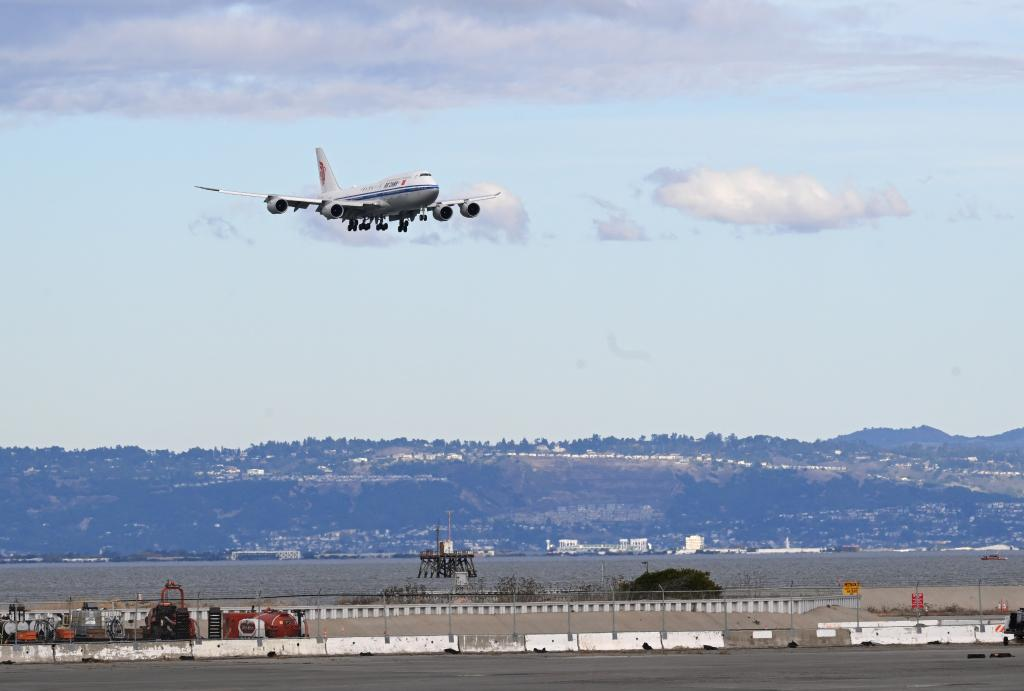
Chinese President Xi Jinping's plane arrives in San Francisco, U.S., November 14, 2023. Xi on Tuesday arrived in San Francisco for a summit with U.S. President Joe Biden, and to attend the Asia-Pacific Economic Cooperation (APEC) Economic Leaders' Meeting. /Xinhua
Chinese President Xi Jinping's plane arrives in San Francisco, U.S., November 14, 2023. Xi on Tuesday arrived in San Francisco for a summit with U.S. President Joe Biden, and to attend the Asia-Pacific Economic Cooperation (APEC) Economic Leaders' Meeting. /Xinhua
The upcoming China-U.S. leaders' summit in San Francisco between Chinese President Xi Jinping and U.S. President Joe Biden is drawing global attention, as it explores collaborative pathways for tackling pressing global issues. This meeting marks the first face-to-face discussion between the leaders of the world's two largest economies since their previous meeting in Bali, Indonesia, a year ago.
This pivotal interaction is highly anticipated by the international community. Stéphane Dujarric, the spokesperson for the secretary-general of the United Nations, noted that the meeting is important for enhancing productive and cooperative relations between the two countries, especially in critical areas like climate change and artificial intelligence.
Ertharin Cousin, former executive director of the UN World Food Programme, said she is glad to see the two countries "putting aside all of the differences and geopolitical challenges" to sit down at APEC, as they "recognize the importance of this type of engagement to address and then to achieve the sustainable development goals."
Cooperation for mutual benefits
Economic issues will be high on the agenda, given the significance of both countries in the Asia-Pacific region.
China and the U.S. rank as the world's leading economies both in terms of nominal GDP and purchasing power parity. World Bank statistics from 2022 show the U.S. with a GDP of nearly $25.5 trillion, while China's stood at about $17.9 trillion.
In recent years, China has intensified its economic and trade collaboration with the 20 other member economies of APEC. In 2022, the combined import and export volume between China and APEC members reached $3,739.08 billion, representing nearly 60 percent of China's trade volume, according to the Ministry of Commerce.
Moreover, more than 73 percent of China's foreign investments were directed toward APEC economies. Among China's top 10 trading partners, eight are APEC members, and China holds the position of the largest trading partner for 13 of these economies.
California Treasurer Fiona Ma, in an interview with China Media Group, emphasized the need for greater integration between the two countries. She noted that both are significant players in the import and export markets and major global economies.
Increased cooperation and harmonious relations between China and the U.S. could lead to expanded economic opportunities for both, she said.

View of the Golden Gate Bridge at sunset in San Francisco, U.S., November 11, 2023. /Xinhua
View of the Golden Gate Bridge at sunset in San Francisco, U.S., November 11, 2023. /Xinhua
Despite existing differences, signs of improving relations between China and the U.S. have surfaced following a series of summer diplomatic initiatives. These include Secretary of State Antony Blinken's visit to China, followed by high-level visits from officials such as Treasury Secretary Janet Yellen, climate envoy John Kerry, and Commerce Secretary Gina Raimondo.
In September, the two countries launched new economic and financial working groups aimed at bolstering communication and strengthening ties on shared interests. This effort, as described by Yellen, is intended to "establish a durable channel of communication."
"The relationship between the U.S. and China is one of the most important relationships of our time," said Yellen at a press conference on November 10. She expressed that the U.S. is seeking to cultivate a "healthy and stable" economic relationship that is mutually beneficial.
Acknowledging the challenges in this endeavor, she noted, "Advancing this vision is not easy. But I believe that we have made significant progress since President Biden and President Xi's meeting in Bali almost exactly one year ago."
Experts view that collaboration between the two countries is crucial for providing global public goods and for fostering peace and development internationally, particularly during this period of economic recovery.
A constructive shift in bilateral relations could potentially yield increased market access and fewer regulatory hurdles, paving the way for these companies to broaden their footprint in China, according to Dewardric McNeal, managing director and senior policy analyst at research and consulting firm Longview Global.

Journalists and staff members work at the international media center of APEC 2023 in San Francisco, the U.S., November 12, 2023. /Xinhua
Journalists and staff members work at the international media center of APEC 2023 in San Francisco, the U.S., November 12, 2023. /Xinhua
Joint work on global challenges
The anticipated dialogue is set to cover a wide range of issues, extending beyond economics to include climate change, artificial intelligence, and the challenge posed by fentanyl. Critical topics such as military communication and key geopolitical issues will also be included. As the Financial Times puts it, this meeting is being viewed as "a new effort" to stabilize relations in a geopolitically delicate environment.
This sentiment of navigating through a period of "great uncertainty and challenges" was also highlighted by U.S. Trade Representative Katherine Tai, who, alongside Secretary of State Antony Blinken, inaugurated the APEC ministerial session. Tai emphasized the importance of the meeting, especially given the current regional context marked by escalating geopolitical tensions, fragile supply chains, and a worsening climate crisis.
Jake Werner, the acting director of the East Asia program at the Quincy Institute, a Washington, D.C.-based think tank, sees potential for a mutually beneficial arrangement between the two sides. Such cooperation, he suggests, could lay the groundwork for a more inclusive and prosperous global system, hinting at the far-reaching implications of these high-level discussions.




